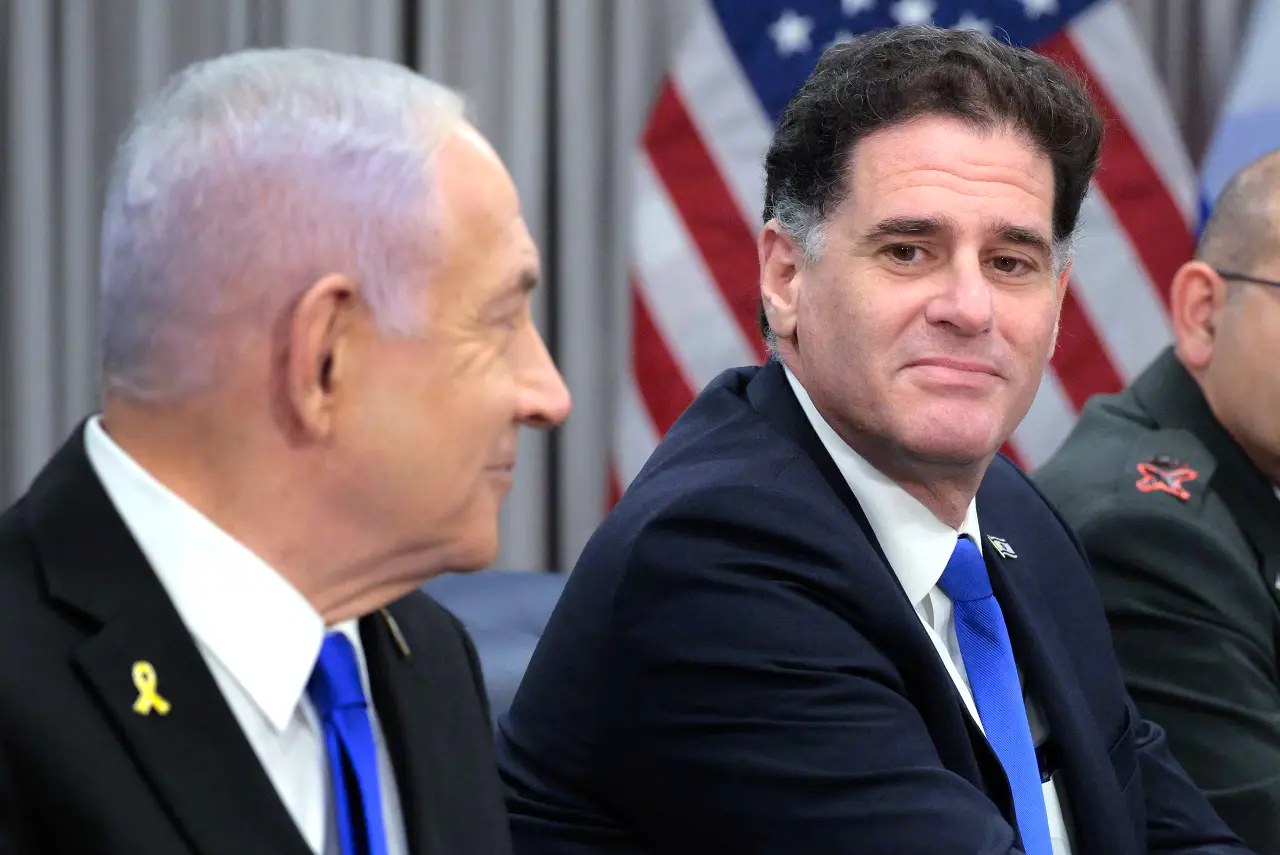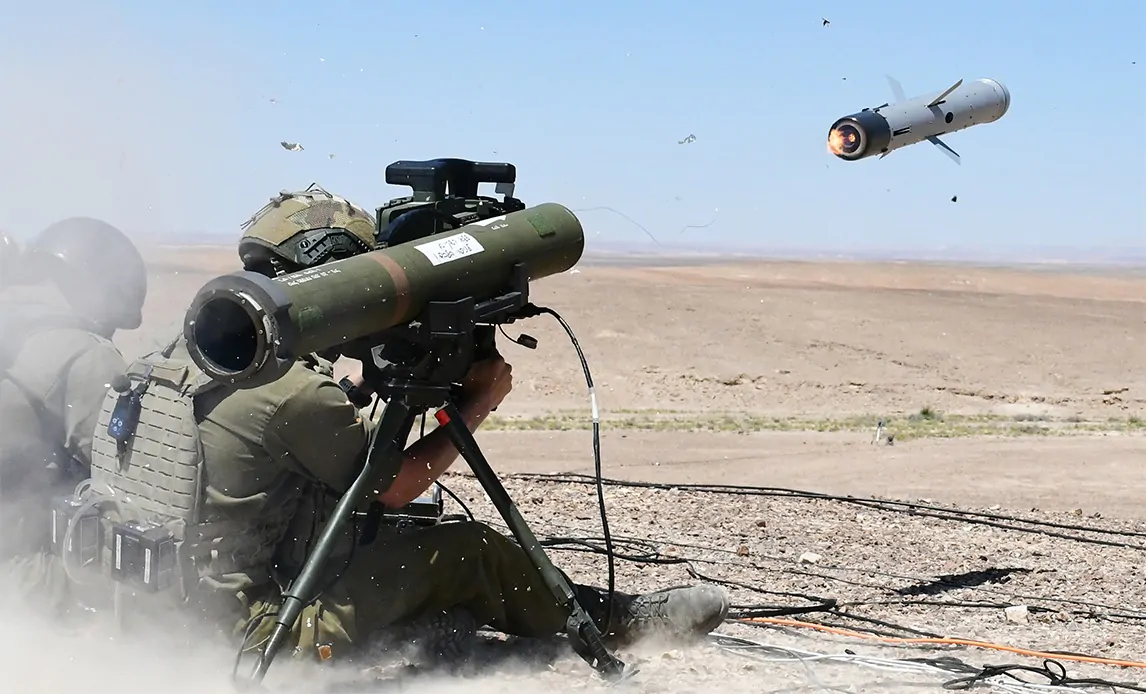Friday Features – October 24, 2025
Intensive – even “frantic” – efforts are underway to secure the remains of murdered hostages, disarm Hamas and stabilize Gaza, as Jared Kushner’s ambitious plans to split Gaza in two and secure normalization between Israel and Saudi Arabia hang in the balance.
Beyond these history-shaping headlines, there are many fascinating, in-depth stories you may have missed. Let’s take a look at two: A deep look into the influence Ron Dermer has had on Israel’s national security; and Israel’s booming defense tech industry.
1. Ron Dermer – Israel’s Behind-the-Scenes Architect of Survival
Sources: Wall Street Journal; Jerusalem Post; Washington Post; Jerusalem Post; One Jewish State; Call Me Back 1; Call Me Back 2
“Right, Ron?”
President Trump interrupted himself twice at the White House lectern to address someone sitting in the front row, as the entire world watched on. It was September 29, 2025 and the President was presenting his 20-point plan to end the Gaza war.
For the past 25 years, Miami-native Ron Dermer has been Benjamin Netanyahu’s most trusted confidant, holding the state of Israel’s most important portfolios: the relationship with the U.S.; preventing Iran from obtaining nuclear weapons; the Abraham Accords; and the war in Gaza.
But Dermer loathes the spotlight. And with the Iran issue mostly solved, he has decided now is the time to leave his official post as Minister of Strategic Affairs.

- Speaking Trump’s language: Dermer has played the role of “Trump whisperer” – during both this term and the president’s first – often using golf analogies (“Peace with the Saudis is a 30-foot putt … Peace with the Palestinians is a hole-in-one through a brick wall”). Less than a week after Trump’s November 2024 victory, Dermer sat down with him, Jared Kushner and Steve Witkoff at Mar-a-Lago for an hours-long session, mapping out plans for a new Middle East. Dermer “was such a well-known and respected figure among all the people there, so it was easy for him to initiate,” said Yaki Dayan, an Israeli diplomat.
- Bibi’s brain: Netanyahu trusts few people; those perceived as political threats or potential successors are pushed out. Netanyahu liked that Dermer had no political ambitions or voter base in Israel. The pair never had a falling-out, and some people close to them say Netanyahu sees their relationship as that of a father and son. Dermer’s fealty to Netanyahu was extraordinary from the start. “Ron always used to say, ‘I have a constituency of one,’” said a former Israeli official. “Ron really believes in his kishkes that he wants to serve the Jewish people.” And the best path toward that has been sticking with Netanyahu.
- The Israeli public “received a gift’ in Dermer: “I saw what he did,” said Shas chairman Arye Deri, another of Netanyahu’s very few long-time confidants. “He has been focused on the Iranian issue for 25 years. From the moment Donald Trump was re-elected, Dermer was on a mission. He worked with Steve Witkoff, Marco Rubio, the president, the vice president – everyone – and they all respect him. Ron Dermer is God’s messenger.”
- From concessions to total victory: In February 2025, Dermer inherited a poisoned chalice: the hostage release/Gaza ceasefire talks. He shifted strategy, linking hostage returns more firmly to Hamas’s defeat and Gaza’s demilitarization, thwarting terror’s leverage – and linking that to the “Formula of the Century” involving Saudi normalization. He faced intense pressure from hostage families (who protested outside his home); but in the end earned their grudging gratitude. He also played the leading role in getting last-minute changes to Trump’s 20-point plan that favored Israel and angered Arab officials who had committed to backing it.
- The “Day After” vision & de-radicalization: Dermer believes the Oslo process fundamentally failed by ignoring Palestinian societal incitement against Israel and Jews. He sees the post-war period in Gaza as a crucial opportunity for a “restart,” requiring not just demilitarization but long-term de-radicalization of the population, comparing it to post-WWII Germany and Japan. He advocates linking Gaza’s reconstruction directly to this de-radicalization process, potentially involving regional partners like Saudi Arabia and the UAE in establishing new governance and educational systems.
- Abraham Accords & Saudi normalization: A key architect of the original Abraham Accords, Dermer remains focused on expanding normalization, particularly with Saudi Arabia. He believes the strategic conditions (strong Israel, weakened Iran, close U.S.-Israel ties under Trump) favor expansion, especially as he believes Trump won’t give Palestinians a veto over the process. However, he acknowledges the Gaza war complicates timing, with Saudi Arabia needing to see fighting “in the rearview mirror” before finalizing a deal.
- Strengthening the U.S.-Israel alliance: Dermer sees the joint Iran operation and the broader war solidifying Israel’s role as America’s most critical strategic partner – an “unsinkable aircraft carrier” (quoting Alexander Haig) vital for U.S. security, projecting power, and enabling the U.S. pivot to Asia. He argues Israel’s growing importance in security, intelligence and technology makes the alliance crucial for U.S. interests, creating the potential for a new U.S.-led regional security architecture with Israel at its core.
“History will remember Dermer for what he has done – for his role in reshaping Israel’s alliances, keeping the country secure and expanding our ties in the Middle East,” said Yaakov Katz, a former editor-in-chief of the Jerusalem Post and a Netanyahu critic. “The noise of the moment will fade, but the record of his service won’t.”
2. Israeli Defense Innovation – ‘They Can Boycott Our Politics but Not Our Technologies’
Israel leads the world in defense innovation, in addition to its many other achievements. It has to, as a country only 40 miles wide on average (including Judea & Samaria) with 7.76 million Jews – facing 57 Arab & Muslim countries and a world ranging from indifferent to hostile Yet, many in that same world are lining up to buy Israel’s defense products.
Established defense-tech companies are thriving. For example, Israel Aerospace Industries has a $25.7 billion order backlog and a projected 2025 net profit of $640 million. At the same time, hundreds of new defense-tech startups have been founded since October 7, focused on: AI and machine learning; cyber-security; drone and counter-drone tech; and battlefield robotics.
According to Startup Nation Central CEO Avi Hasson, the number of Israeli companies being created in one year alone was the equivalent of growing “on steroids,” with over 150% year-over-year growth.
Some highlights:

- When Euro security is on the line, Israel is indispensable: German Chancellor Merz slapped an arms embargo on Israel in August, just as the IDF was launching Gideon’s Chariots 2. But that did not stop Germany from signing a $2.3 billion deal with Israeli defense giant Rafael to equip its army with Spike anti-tank missiles. And that’s on top of Berlin’s $3.8 billion contract with Israel Aerospace Industries (IAI) for its Arrow 3 missile defense system, slated for delivery by the end of 2025; and a $1.2 billion deal to buy three Heron drones from IAl. (The Judean and Bloomberg.)
- The Spike, Rafael’s global ambassador: Over 40 countries and half of NATO use this modular, multi-platform weapon (pictured above) that can be mounted on everything from attack helicopters to ground vehicles and naval systems. Rafael, which also produces the soon-to-be-must-have Iron Beam laser defense system, has embedded itself within Europe, creating joint ventures to produce the Spike locally. (Globes.)
- A billion dollar contract with the U.S. Army: Israeli companies will be providing the Army with the HERO 120 loitering munition, along with system integration, lethality package development, program management, and sustainment support. The HERO 120 delivers real-time intelligence, surveillance and reconnaissance (ISR) capabilities, alongside lethal strike options. “This contract marks a significant milestone in our partnership with the U.S. Army,” said Mistral Inc. VP Yoav Banai. (Jerusalem Post.)
- ThirdEye Systems inks NATO drone detection deal: As drones continue to pose threats to European countries amid the Russian-Ukraine war, the Israeli tech innovator has secured its third NATO-linked contract so far in 2025. ThirdEye’s systems, developed over five years with substantial investment, leverage its proprietary electro-optical and AI-based imaging technology, setting new standards for mobile, all-weather, 24/7 surveillance. (Jerusalem Post.)
- Deepening ties with South Korea: Rafael and Hyundai have signed a deal to integrate Israel’s battle-proven TROPHY Active Protection System (APS) onto South Korea’s K2 Main Battle Tank. “We look forward to combining Rafael’s operational combat experience with Korea’s industrial and technological strength,” said Tzvi Marmor, head of Rafael’s Land and Naval Systems Division. (Jerusalem Post.)
It’s not just Israel’s defense tech the world eagerly seeks. Israeli desalination firm IDE Technologies has reportedly been using Swiss front companies to bypass Arab/Muslim boycotts, and operate in Qatar, Kuwait, Saudi Arabia, Yemen, Libya, Algeria, Tunisia, Afghanistan and Pakistan.
